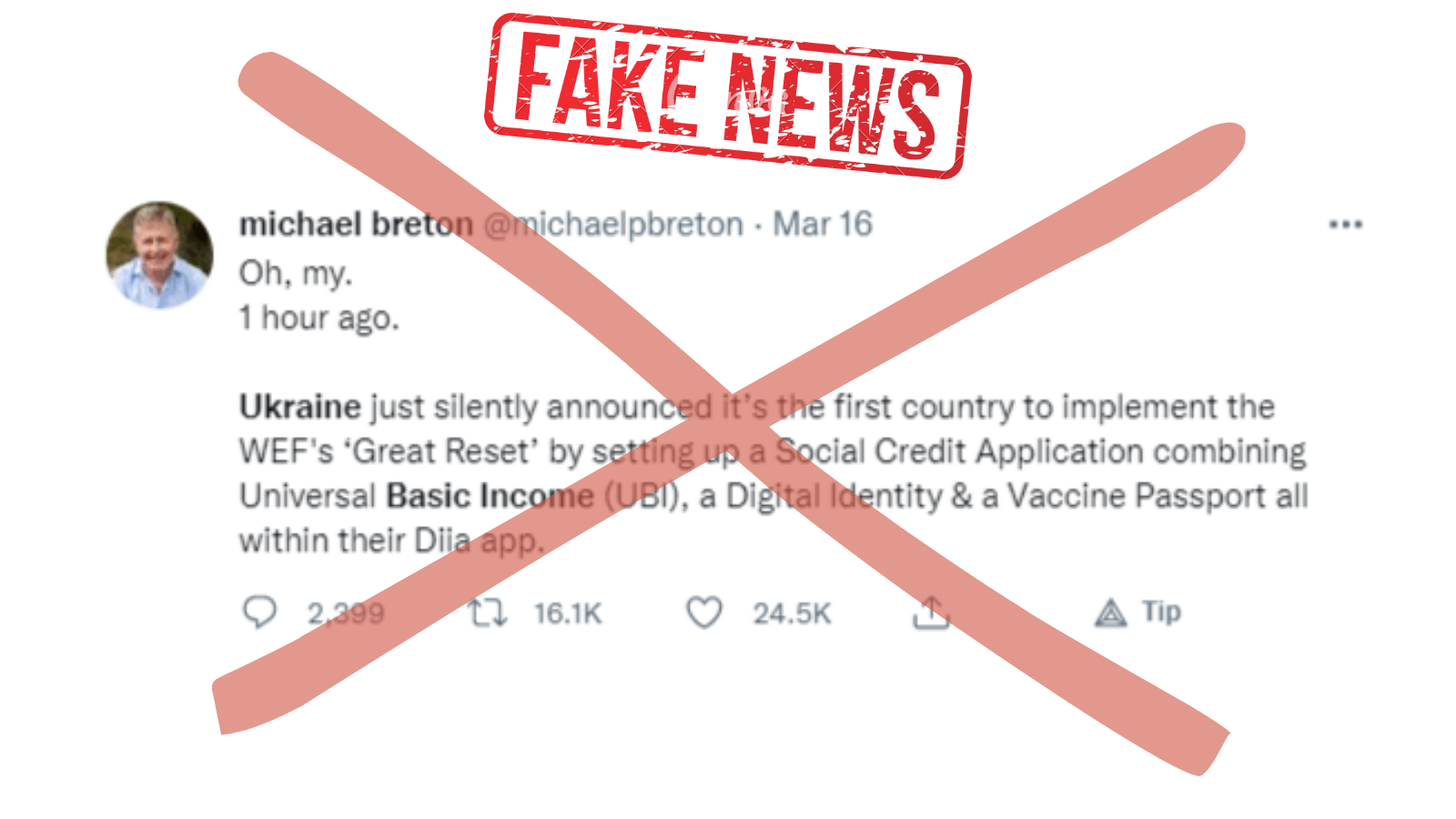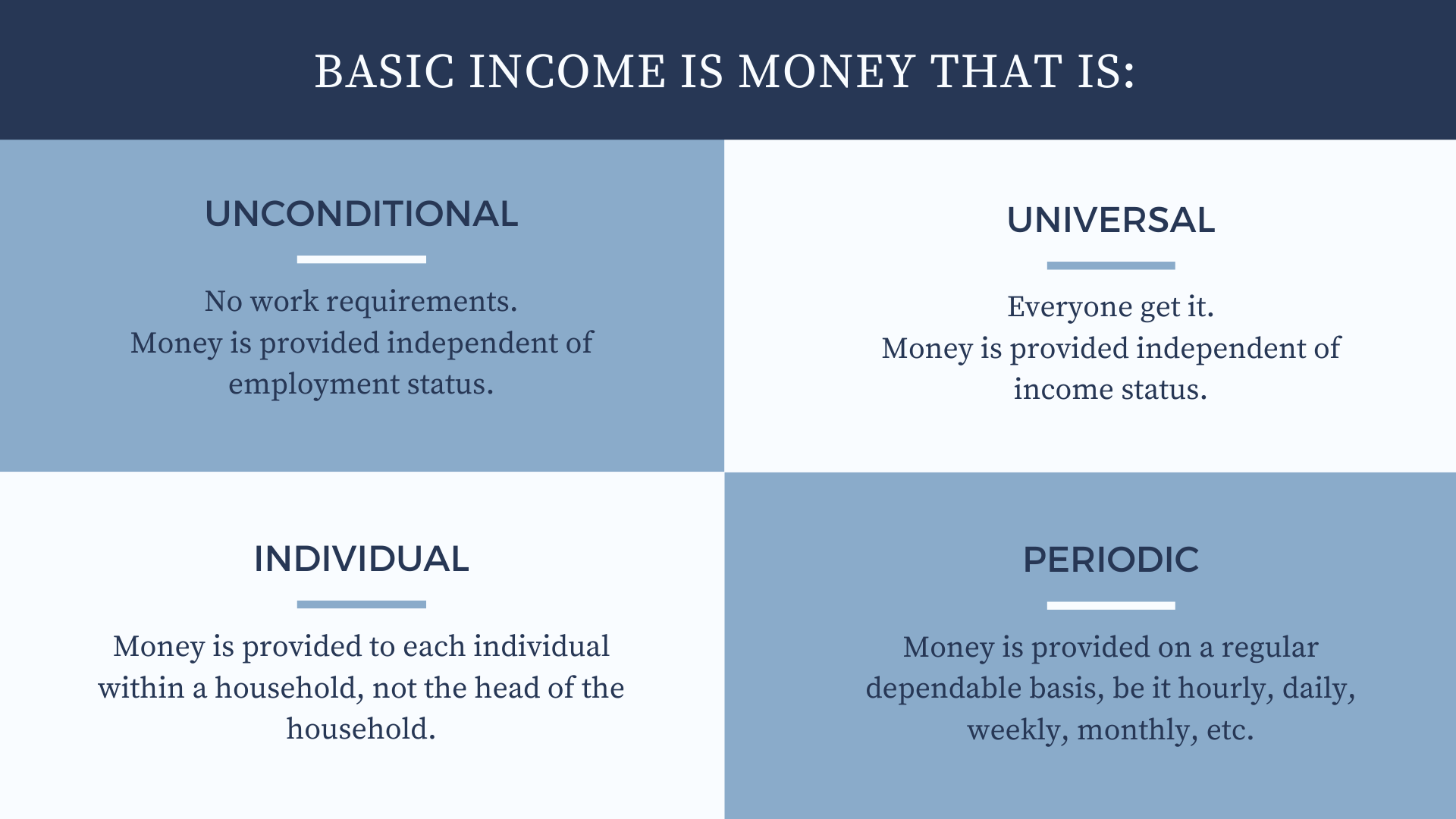No, Ukraine did not just introduce Universal Basic Income. Here is what it did do.

On December 19, 2021, Ukraine launched “ePidtrymka” which translates to eSupport. It was launched on Diia which is a smartphone app and web portal that itself was launched in February 2020 to function as a means of storing and sharing digital versions of documents, and also making government services available digitally instead of requiring in-person interactions only. Because Diia made it possible for Ukrainians to prove their vaccination status as one of the over 50 services that is now available on Diia, and because ePidtrymka is a service that rewarded people for getting vaccinated, there are people claiming that the “Great Reset” has just begun in Ukraine with the trifecta of universal basic income, vaccination, and social credits. In this post I will explain what’s actually going on, because what I’m seeing shared on social media is getting way out of hand.
First of all, it’s important that everyone knows what UBI is and what it isn’t. To be considered UBI, a program must meet certain criteria. It must be an amount of money that is provided to everyone individually, without work requirements, on a regular recurring basis.

The best example of UBI is in Alaska where every year since 1982, everyone gets a cash dividend that they can spend on anything. A program cannot be called UBI if it’s a one-time payment like a stimulus check. Something also cannot be called UBI if it only goes to some people, or if it’s a voucher of some kind like food stamps that can only be used on approved foods. The entire point of UBI is to provide people the freedom of cash to make their own decisions on what they feel is most important to them, and to trust everyone by not making them do anything first in order to receive the income. What Ukraine has done is really interesting, and it’s been a huge help to a lot of people, but it is not UBI, at least not yet.
As with most conspiracy theories, there is a grain of truth to them, and in this case, it’s true that people in Ukraine did get rewarded for getting vaccinated. That’s also not unique to them. Here in Louisiana, there was a “Shot for 100” program that for a limited time provided people with $100 Visa gift cards for getting vaccinated. That kind of program happened all over the US and was basically what Ukraine did, by providing people with 1,000 UAH which is about $34. However, vaccinated Ukrainians couldn’t spend it on anything, because it was also meant as a stimulus program designed to help businesses most hurt by the pandemic. Because places like restaurants and gyms suffered the most financial loss during the height of the pandemic, ePidtrymka cards could only be used at those kinds of businesses. Other possible purchases were books, concerts, theaters, museums, and transport.
The point was to help these businesses out of the hole Covid put them in while also encouraging vaccination, which actually makes a lot of sense considering those same businesses were hurt the most because they’re the places where Covid gets transmitted the most. It would be bad for these businesses to suddenly get a lot of unvaccinated customers and lead to another Covid spike. Additionally, cashback debit and credit cards function in a very similar way, where different kinds of purchases result in different reward levels. It’s also somewhat similar to EBT cards (aka food stamps) that can be used to only buy certain foods, but not all foods.
There was also a time limit added to the vaccination reward, where it needed to be spent within four months or forfeited. This again was meant as a stimulus, encouraging people to spend instead of save in order to more quickly grow the Covid-impacted economy. Additionally, Ukraine was planning on making the ePidtrymka program available offline in 2022 instead of only available online and via the app. It was never intended to only be available online.
On January 24, 2022, there was the first expansion to the ePidtrymka program, which enabled those over 60 to spend their rewards on medicines too. This was soon followed on February 7 by extending the rewards to everyone over age 14 and also expanding available spending to “educational services, children's extracurricular activities, staying in a summer or sports children's camp, sporting goods, stationery, and school supplies.” This was then followed on February 14 by expanding purchases to housing and communal services for those over age 60.
The next expansion of the program was scheduled to happen on March 14 with the introduction of an additional 500 UAH (about $17) to reward people for getting a booster shot, and also the ability of those with disabilities to spend their rewards on medicine, housing, and communal services too, but then Putin sent Russian troops over the border to take over Ukraine. Thus the next expansion of the program ended up being the ability of everyone in Ukraine with ePidtrymka rewards they hadn’t yet spent to donate their funds to the Ukrainian military. This was soon followed by the lifting of all restrictions on spending.
Since March 2, as a result of the war, all Ukranians with ePidtrymka rewards have been able to spend their rewards exactly as cash, on anything they feel is best or they most need. And on March 8, an additional 6,500 UAH ($220) was added through the ePidtrymka system to every employee in the most war-impacted areas for whom USC is paid (their version of Social Security), including every entrepreneur, without any vaccination requirements applied, and without any limitations on spending - including time restrictions.
All of the above are the facts. They reflect actual reality. Now, do these facts paint a picture of Ukraine looking to take advantage of the Russian invasion of their country to implement an unconditional, universal, monthly-recurring cash payment attached to vaccination requirements and a social credit score system?
The truth is that Ukraine innovated a way of more productively administering government programs. One of those programs was a small one-time reward for getting vaccinated against Covid that was meant to support those sectors of Ukraine’s economy that suffered the most from quarantine restrictions. That program then served as a means of helping the people of Ukraine in a time of national emergency in a way that wouldn’t have otherwise been as quickly implementable. Thanks to the plumbing already existing, Ukraine was able to use those pipes to instantly get money to the people of Ukraine that they could spend on anything they need, vaccinated or not, during an invasion by Russia.
Now that you know what Ukraine really did, ask yourself in whose interest it is that you instead believe in some conspiracy theory that feeds on your fears? In whose interest is it to create a bogeyman of Ukraine? Who might find it useful to put resources into amplifying such fears, and make it so that tweets about it on Twitter and posts about it on Facebook end up being seen by a lot more people than they otherwise would? The answer of course is Vladimir Putin.
This also isn’t only about Ukraine. This kind of disinformation campaign is about reducing trust in the institution of government itself, and it goes beyond Ukraine. The same things about ePidtrymka are being said in Canada about Bill S-233, that it’s somehow a bill designed to strip Canadians of their freedoms, and force them to get vaccinated and do what they're told in order to receive their pensions.
Senator Paula Simons actually just set the record straight there by reading into the record some of the insane things being said about the bill that simply aren’t true, and she nailed the real goal behind resources being put into amplifying such disinformation on social media. It’s all about increasing fear and eroding trust.
I highly recommend watching the entire thing, but around the 11m30s mark, she shares a story about how one of her constituents fell for this disinformation and said it’s scary to live in fear every day. Here is what Simons then said:
“That, of course, is the point of this whole disinformation campaign: to create fear and distrust; to keep people scared and vulnerable; to erode our social contract, the social fabric and our confidence in our fellow Canadians, replacing it with suspicion bordering on paranoia. The purpose of this strategy isn’t to defeat Bill S-233, which has only the smallest chance of becoming a law anyway; no, it’s to whip up a hysterical frenzy to convince ordinary Canadians — decent, caring Canadians like Missy — that their political leaders and their political institutions are not to be trusted and then to trick and con ordinary, caring people just like Missy into sharing this fake information with their families, faith communities or their friends on Facebook.”
This is why Putin has invested Russia’s resources over the years into social media influence campaigns. It is meant to destabilize democracies. It is meant to create so much distrust among citizens in their representatives and their governments that democracy itself fails. If self-government requires an informed public, a disinformed public cannot function. A house divided against itself cannot stand, and if it cannot stand, then it certainly can’t stand against Putin and his ambitions.
Besides, even if there were some grand conspiracy to implement universal basic income, but do it in a way that isn't actually UBI and is instead full of conditions like vaccination and control mechanisms like only being able to spend it on certain things, then the proper response isn't to fight against UBI, but to instead fight for UBI implemented as an inviolable constitutional right of citizenship. It would have been a terrible idea to not pass Social Security into law in the belief that seniors would do anything the government tells them to do. That obviously isn't true at all.
Putin thinks you’re too stupid to tell the difference between disinformation and reality. Please share this article instead, and prove him wrong.

Do you support independent content like this? Please click the subscribe button and also consider making a monthly pledge or buying a copy of my book.
_large.jpg)
UBI Guide Newsletter
Join the newsletter to receive the latest updates in your inbox.
